Hello, my friends, and welcome back to another blog post :)
Today, we are going to be talking about the various perks of efficient practice. I’m sure you've heard of the 10 000 hour-rule - the idea that in order to master a certain skill, you must first put in 10 000 hours of practice. And not just any practice - efficient, quality practice.
So let’s break this down further. Apart from simply mastering a certain skill, are there other perks that come along with practicing efficiently? Is it possible to get some extra benefits to supplement your end goal?
Of course it is, so let’s talk about them!
STAYING MOTIVATED
One of the main reasons musicians plan their practice time is to stay motivated. Keeping yourself accountable day-to-day can make an enormous difference in your overall motivation, resulting in faster progress.
One of the most popular ways to do this is to keep a practice journal or planner. Tracking your progress, to-dos and weekly goals keeps you on your toes, and makes it easier to consistently come back to your instrument - and with tools like the mood tracker and efficiency tracker, the Efficient Musician Practice Planner makes the journaling process fun and engaging, every step of the way 📖.
When a day comes along and you’re just not feeling it, looking back into your planner to see all your past progress can be the deciding factor in whether or not you will put in those extra hours 🤗!
Efficient practice not only ensures faster progress - it also increases your willingness to keep coming back - and who doesn’t like to see that their hard work is paying off?
AVOIDING INJURIES
Though it might not be obvious, efficient practice is directly correlated to injury prevention.
Look at it this way: would you likely get more tired from practicing longer or shorter hours?
Many injuries among musicians are caused from excess stress and repetitive motions. Of course, you may say that playing an instrument at all is a form of repetitive stress, but it’s really all about changing up your activities in the practice room.
Let me explain.
With efficient practice, you can make use of short, intense periods of focused playing and swiftly move onto the next section, avoiding endless repetition, which in turn helps avoid unwanted tension.
At the end of the day, it’s not about how many hours you put in, but the quality of those hours. If your practice is efficient, you may not need to spend as many hours at your instrument. (Or you may choose to, effectively covering more material in the same amount of time).
If your practice is efficient, how you use your time is really up to you.
Why not give yourself that freedom to choose?
HAVING MORE FUN
This one seems like a no-brainer, but can you think back to the last time you were actually having fun at your instrument?
You see, when your practice is efficient and you waste little to no time in the practice room, you leave space for learning the fun stuff too... I can’t tell you how many times I was able to *secretly* learn the pieces I actually wanted to play without being suspiciously unprepared for my piano lessons... And that was all because I had reserved that extra time through efficient practice!
You may think I’m kidding, but I’m really not.
It’s a simple equation:
Efficient practice = less time spent practicing = more free time!
If you’re not part of the practicing fan club (like myself on most days), you can interpret this point as meaning that you have more time to focus on what you actually want to do, apart from playing your instrument.
Efficient practice unties your hands and helps you take control of your time, progress and motivation. It’s a win-win-win all around.
Have you tried it? 😉
